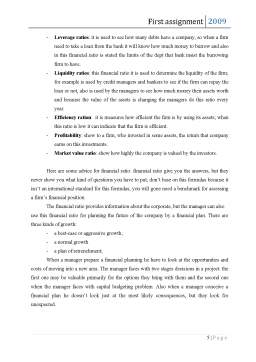Extras din referat
Chapter 1 Finance and Financial Manager
The first chapter of the book is talking about the corporations. First of all we can say that not all businesses are corporations. We can identify three types of businesses: sole proprietorships, partnership and corporate finance.
Almost all the large businesses are organized in corporations. The corporation shares are held by a group of investors who own the corporation but they don’t manage it.
First time when a firm is established in corporation are only a small group of investors, some managers of the company and a few backers. At this stage the company doesn’t have shares open for public trade and we can say that the firm is closely held. After some time when the corporate will grow its shares will be trade on the public market and this corporations are known as public companies.
Shareholders elect a board of directors, which can be drawn from top of management for the positions of directors and others can be for the positions of non-directors, representing them and act in best interest of them.
This separation of ownership and management gives the corporation permanence because for example, if a shareholder sells his share to a new investors the activity of the corporation will not disrupt and the other side if a manager is dismissed or quit, he will be replaced and the activity will be continuous.
Corporations have limited liability, which means that stockholders will not be able to be responsible for the firm debts unlike partnerships or sole proprietorships which they can.
The corporation is based on articles of incorporation that set out the purpose of the business, how many shares can be issued, numbers of directors and so on. We can say that a corporation is a legal “person” that will be able to burrow or lend money, can sue or be sued, pays taxes but cannot vote.
This type of organization have advantages and disadvantages. For example one advantage is that it can raise money by selling new shares to investors and it can buy those shares back. A disadvantage is that a corporation’s legal machinery and communicating with a shareholders can be time-consuming and costly.
A corporation needs a large variety of tangible goods like machinery, factories, offices and intangible goods such as technical expertise, trademarks, patents, etc which are called real assets. To buy this assets the corporation sells pieces of paper called financial assets or securities.
Between firm operations and the financial markets stands the financial manager. His role is to trace the flow of cash from investors to the firm and back to investors again. The managers from large corporations must decide which assets should invest and also where those assets should be located.
The big corporations are scattered around the globe. Shares are trade in financial center such as New York, London, Tokyo. Bond and loans are easily trade in all of the world moving across national borders. For this kind corporations, day-to-day cash management becomes a complex task.
Financial manager is a term who refer to anyone responsible for a significant investment of financing decision. In the smallest corporations is only one person but in most of the cases responsibility is dispersed.
In small companies there is often only one financial executive which is called treasurer. But the larger company have also a controller, who prepares the financial statements, manages the firm’s interval accounting and looks after its tax obligations. The difference between a treasurer and controller is: the treasurer’s main responsibility is to obtain and manage the firm’s capital, while the controller ensures that the money is used efficiently. The larger firm usually appoint a chief financial officer (CFO) which oversee both the treasurer’s and the controller’s work. The controller of CFO is responsible for organizing and supervising the capital budgeting process. Sometimes the ultimate decisions for important issues are taken by the board of directors.
The large corporation the ownership and management are separated because is absolutely necessary, because this kind of corporation can have hundreds of thousands of shareholders and is no way them to involve in management of the corporation.
This separation has advantages for example the ownership can hire a professional manager to accomplish his objectives. But this separation brings and problems when theirs objectives are different and this is not the only one problem for example the shareholders have to think how to work with managers so they will accomplish their interests. Another problem is for example, the interests of shareholders and bondholders that can be different so the company can have big issue because of this.
We can think at the company’s overall value like a pie divided among a number of claimants. All this claimants are included in a complex web of contracts and understandings.
The principal-agent problems can be easily resolved if everyone had the same information. All the participants on a corporation have different information about the real value or financial assets.
When a company sells shares and bonds to raise money is creating an issue which is known as primary issue and it is sold in the primary market. The corporation allow investors to trade stocks and bonds between themselves so they can raise new cash. This operations are known as secondary transactions and they take place in the secondary market.
The financial manager is a link between the company and financial institutions such as banks, pension funds and insurance companies. Also the financial institutions are intermediaries that gather the savings of many individuals and reinvest them in the financial markets. In United States the most important financial institutions are insurance companies more even the banks.
Preview document
Conținut arhivă zip
- Finance and Financial Manager.doc



















